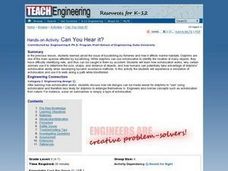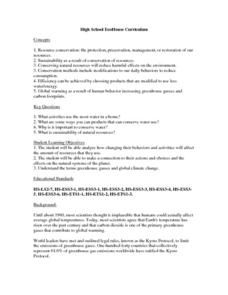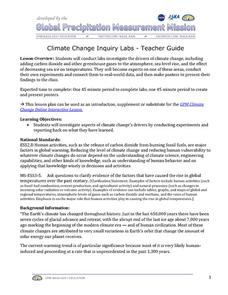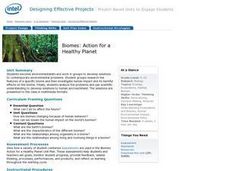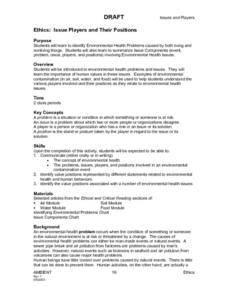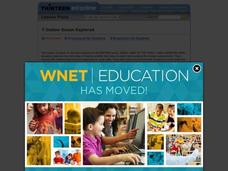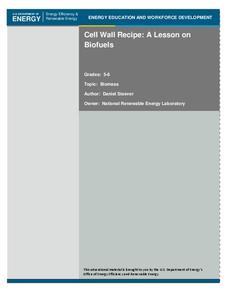Curated OER
The Best Place in the United States to Live
Students, working in small groups, analyze information provided in U.S. maps to make a logical determination of the best place to live in the United States in regards to natural and human-made hazards. Then, working individually, they...
Curated OER
Escape! Survival of the Fittest Grasshopper
Fourth graders, in groups, design a paperclip grasshopper. They determine its ability to survive a prey by jumping high, far, or with a distracting behavior.
Curated OER
Can You Hear It?
Students work together to discover the concept of echolocation. They examine dolphins and their behaviors. They discuss how humans could use this information to help them in their everyday lives as well.
Curated OER
Adaptable Mandibles
Students define adaptation and highlight example of adaptation in birds and other animals. They study feeding techniques of seabirds and investigate the effect that trash has on wildlife.
Curated OER
High School EcoHouse Curriculum
How has the level of carbon dioxide changed over recent years, and what is contributing it? Groups work together to research and present their findings in a creative way. Also built into the lesson is a visit to a sustainable house, but...
Curated OER
Barnegat Bay Watershed
Middle schoolers design a model watershed. In this watershed lesson, students learn the needed parts of a watershed and how they work. Middle schoolers evaluate how watersheds effect communities.
NASA
Climate Change Inquiry Lab
With global temperatures on the rise faster than ever recorded, the effects of a heating planet could be devastating. Allow learners to discover just what the world is in store for if the warming continues through a series of videos, a...
PBS
Symbiotic Strategies: The Secret Lives of Sharks and Rays
Learners investigate the interaction in an oceanic ecosystem. For this symbiotic relationship lesson, high schoolers investigate how ecological relationships evolve over long periods of time in order to maintain balance and stability of...
Curated OER
Food Webs in the Barnegat Bay
Students investigate the food webs in the Barnegat Bay. In this organisms lesson, students use a graphic organizer to illustrate the types of consumers in the bay. Students use reference books to continue to research the animals found in...
Kenan Fellows
What Element Would You Be?
Primo Levi wrote a collection of short stories comparing his life from Italy to Auschwitz to elements in the periodic table. Pupils read an excerpt from his book and research the characteristics of various elements. Then, they make a...
Curated OER
Continents and Oceans
Learners identify oceans and continents and their locations on a map. They color-code and label their own map of the world's continents and oceans. They play the game Continents and Oceans to identify specific areas.
Curated OER
Are You Susceptible?
Students play a game to explore the relationship between genetic variation and environmental factors in the onset of heart disease. They consider the implications for disease prevention of increased knowledge about genetic variation.
Curated OER
Barrier Islands
Third graders explore how barrier islands work. In this erosion lesson, 3rd graders create barrier islands in stream tables and simulate wave action to see how it affects their island.
Curated OER
Biomes: Action for a Healthy Planet
Students become environmentalists. They develop solutions to modern environmental problems.
Curated OER
Issue Players and Their Positions
Students identify Environmental Health Problems caused by both living and nonliving things. They summarize Issue Components (event, problem, issue, players, and positions) involving environmental health issues such as contamination in...
Curated OER
Indian Ocean Explored
Students examine the rich array of marine wildlife that lives in waters surrounding the Indian subcontinent. They explore the relationships among organisms in coral reefs. They explore environmental dangers to coral reefs and research...
Discovery Education
Sonar & Echolocation
A well-designed, comprehensive, and attractive slide show supports direct instruction on how sonar and echolocation work. Contained within the slides are links to interactive websites and instructions for using apps on a mobile device to...
University of Minnesota
Mirroring Emotions
Do you ever give your class the "teacher look"? Without saying a word, they become silent and engaged (hopefully). How do they know what you're thinking? Explore the concept of nonverbal communication and how it relates to our mirror...
Curated OER
Cell Wall Recipe: A Lesson on Biofuels
Biotech engineers discover that changes in the DNA code for cell wall formation can help create crops better suited for biofuel production. They extract DNA from wheat germ. They decode paper strips with codes and relate the activity to...
Curated OER
Destination Outer Space
Young scholars investigate space travel. In this space travel lesson students examine space exploration history, engineers and scientists involved in space exploration, and Newton's third law of motion. Young scholars make rockets.
Consortium for Ocean Science Exploration and Engagement (COSEE)
Arctic Smorgasbord
Though the walrus spends roughly one third of its time on land, it eats organisms that live on the bottom of the ocean. The first in a series of five, the lesson uses a variety of plant and animal cards to have scholars build an arctic...
Curated OER
Ecosystems and Remote Sensing
Young scholars obtain remote sensing data to compare and contrast global biomass data with global temperature data.
Curated OER
Explore the World through Habitat
Open a world of discovery with habitat-related lessons.
Green Education Foundation
How Loud is Too Loud?
Ever wonder how loud a sound has to be to cause damage? Young scientists explore sound properties by researching decibel levels. They discuss how sound is perceived by our ears and our brains and why it can cause negative health effects...




